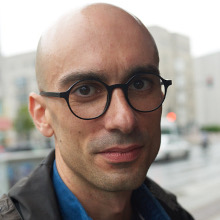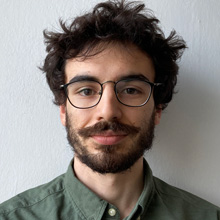Team
Jobs
2 postdoctoral fellowships
1 postdoc fellowship: a public call is announced to award 1 postdoc fellowship (24 months renewable) titled “Machine Translation in Disabilities Studies”. The expected starting date is approximately March 1, 2026. The research fellowship amounts to Euro 38.574,18 per year (gross to the recipient).
The research fellow will work closely with the PI, Prof. Matteo Pasquinelli, and with the AIMODELS team. The research project investigates the role of the paradigms of intellectual disabilty and language pathology in the history of AI. It brings together disability studies, translation studies, philosophy of language, and critical AI research to investigate how notions of normalcy, ability, and intelligence inform the design and evaluation of language technologies including current Large Language Models. The candidate is expected to organise a symposium on the topic in collaboration with the AIMODELS team and to publish an Open Access, peer-reviewed monograph on the topic in English, as well as two class-A, peer-reviewed journal articles.
Call for postdoc fellowship application [ITA] (deadline: February 2nd, 2026, at 1PM Rome CET)
1 postdoc fellowship: a public call is announced to award 1 postdoc fellowship (24 months renewable) titled “Critical History of Deep Learning”. The expected starting date is approximately March 1, 2026. The research fellowship amounts to Euro 38.574,18 per year (gross to the recipient).
The research fellow will work closely with the PI, Prof. Matteo Pasquinelli, and with the AIMODELS team. The research project investigates the history of AI and deep learning through an interdisciplinary and critical approach. It examines the evolution of the statistical techniques at the core of AI and how they have influenced paradigms of the mind across disciplines. Drawing on methods from historical epistemology and ethnography, it traces the circulation of ideas between computer science, statistics, psychology, and neuroscience, with particular attention to the Free Energy Principle and similar constructs. The candidate is expected to organise a symposium on the topic in collaboration with the AIMODELS team and to publish an Open Access, peer-reviewed monograph on the topic in English, as well as two class-A, peer-reviewed journal articles.
Call for postdoc fellowship application [ITA] (deadline: February 2nd, 2026, at 1PM Rome CET)
Call closed
- 1 postdoc fellowship: a public call is announced to award 1 postdoc fellowship (24 months renewable) titled "Neuronormativity in the knowledge society". The expected starting date is approximately October 15th, 2025. The research fellowship amounts to Euro 38.574,18 per year (gross to the recipient). The research fellow will work closely with the PI, Prof. Matteo Pasquinelli, and with the AI MODELS team. The research project investigates the genealogy of neuronormativity, tracing its roots from the colonial past of the Western world to its role within the paradigms of the knowledge society and its operative dimension in forms of knowledge automation, such as AI. The first part of the project reconstructs the history of practices, procedures, and techniques used to measure cognitive abilities and disabilities, and the way they often predate technological development. From this perspective, the history of information technologies will be examined, addressing cognitive metrics in terms of their social and economic implications. The second part of the project focuses on the history of models of the mind and the circulation of ideas and practices among philosophy, psychotherapy, cognitive science, and artificial intelligence in the 20th century. It explores how models of the mind are implicit in practices of neuronormativity and, conversely, how social norms invisibly constitute different philosophies of the mind.
Call for postdoc fellowship application [ITA] (deadline: August 26th, 2025, at 1PM Rome CET)
- 1 short-term research fellowship: a public call is announced to award 1 research fellowship (12 months) titled "Knowledge extractivism and socialisation: A perspective from the Global South on the new AI infrastructures". The expected starting date is approximately 15th September, 2025. The research fellowship amounts to Euro 13,500.00 per year. The research fellow will work closely with the PI, Prof. Matteo Pasquinelli, and the AI MODELS team. The research will consist studying the development of AI platforms in contemporary India with a focus on platforms and monopolies that extract data from traditional forms of knowledge and areas of production ranging from agriculture and small-scale industry to informal work and gig economy. The short research fellow will also support the organization of a seminar. The research findings will contribute to the production of an academic article.
Call for short-term research fellowship application (deadline: August 22nd, 2025 at noon - 12.00 Rome CET)
- 1 postdoc fellowship: a public call is announced to award 1 postdoc fellowship (12 months renewable) titled "Models of Collective Intelligence". The expected starting date is approximately February 1st, 2025. The research fellowship amounts to Euro 24,450.00 per year (gross to the recipient). The research fellow will work closely with the PI, Prof. Matteo Pasquinelli, and in detail: 1) conducting research on the history and epistemology of the models of collective intelligence; 2) compiling, under the PI's supervision, a database of scientific literature; 3) co-organizing with the PI an international symposium in English titled "Models of Collective Intelligence"; 4) editing the proceedings of the symposium for an anthology in English.
Call for postdoc fellowship application (deadine: December 12th, 2024 at noon - 12:00 Rome CET)
- 3 PhD fellowships are available in history, philosophy, and critical studies of artificial intelligence (AI) in the historical context of the definitions of intelligence and mental disability. Two fellowships are open to proposals in the fields of natural and cognitive science epistemology, contemporary philosophy and psychoanalysis, philosophy of language, semiotics, literary studies, translation studies, psychology of learning, and critical pedagogy. One fellowship supports a research of historical epistemology on the intellectual world of early AI, connectionism, and psychometrics.
Call for PhD fellowships application (deadline: May 23rd, 2024)
People
Matteo Pasquinelli
Principal Investigator
Paolo Caffoni
External expert
(HfG Karlsruhe, Germany)
Giorgio Ciani
PhD student
Lorenzo De Lellis
PhD student
Alexandra Deem
Associated expert
(MSCA project AI INFLUENCE)
Giovanni Fava
Post-doc researcher
Ganesh Gopal
Research fellow
(French Institute of Pondicherry, India)
Tommaso Guariento
Post-doc researcher
Beatrice Spampinato
Project Manager
Bernardo Paci
Post-doc researcher
Guests and associates
- Lucy Suchman, Visiting Scholar (15/04/2025-15/05/2025), Lancaster University
Research network
- [aimodels] - Internal mailing list of the ERC project AIMODELS.
- [critical-ai] - International mailing list of the Critica AI Studies Seminar (see below).
- [allmodels] - International mailing list of Critical AI Studies.
- [po-epi] - International mailing list of the Political Epistemology research network.
Critical AI Studies seminars
Students, professors and researchers are welcome to the Critical AI Studies Seminar (bi-weekly schedule). Each session features presentations of ongoing research, as well as readings and discussions of critical texts. Each seminar lasts approximately 2 hours and is conducted in a hybrid format: in person in Venice and online. To join the group, please send an e-mail to aimodels@unive.it.
Topics: the seminar series offers a critical exploration of AI, focusing on its historical development and deep connections to the practices of formalizing and measuring labor, language, knowledge, and social relationships. It focuses on how modelling practices shape the relationship between knowledge and power. It gives attention, for instance, to discrimination based on gender, race, and class alongside the evolution of information technologies. Guided by historical epistemology, it engages with the perspective of various disciplines such as political philosophy, philosophy of mind, philosophy of medicine, linguistics, semiotics, and the sociology of labor. Special attention is given to the material tools and practices that have enabled AI as a form of automated ‘rationality.’ The goal is to see AI as an epistemic object that bridges the technical development and natural, social, and human sciences, to analyse AI not just as a technology but as part of a long and complex cultural and political history.











